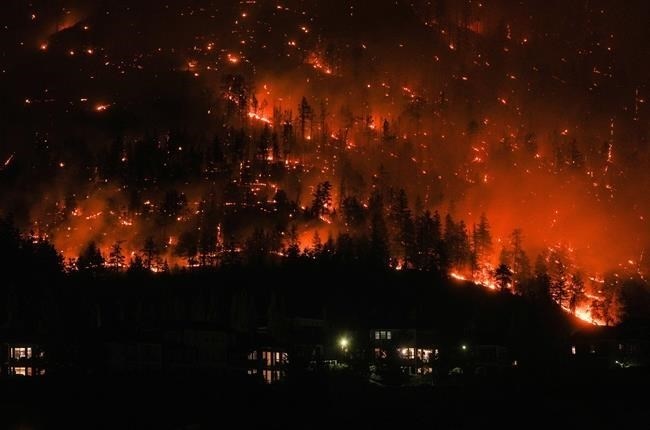
The McDougall Creek wildfire burns on the mountainside above houses in West Kelowna, B.C., on Friday, August 18, 2023.
Image Credit: THE CANADIAN PRESS/Darryl Dyck
September 21, 2023 - 5:30 PM
The McDougall Creek wildfire, and the blazes it sparked in Kelowna and Lake Country, have convinced some residents commit to FireSmarting their homes and properties.
But West Kelowna Fire Rescue Chief Jason Brolund is taking that message far beyond the Central Okanagan.
“We receive $200,000 a year in grant funding from the province for FireSmart, which is much appreciated,” Brolund told iNFOnews.ca. “We’re able to do some things but I could easily spend $1 million on FireSmart activities in our community.”
He spoke to iNFOnews.ca today, Sept. 21, after returning from the Climate Ambition Summit at the United Nations in New York where he spoke yesterday, having been invited by Prime Minister Justin Trudeau’s office.
“He was speaking to delegates and leaders and he invited me along to give a glimpse of the experience we had here in the Okanagan,” Brolund said. “I was able to share all of our firefighters’ hard work and relate that back to the fact that it’s obvious that something has changed in our climate. My task was to try to inspire these very powerful people to think differently in the face of climate change.
“The cost of this fire will exceed $20 million when it’s all said and done. My intention was to say: we’re spending the money on the wrong end of the problem. If we didn’t have to fight the fire and, instead, could devote that money towards proactive measures, the number of things we could have done are humungous.”
READ MORE: In wake of wildfires, some Okanagan communities taking FireSmart more seriously
Out of the $200,000 FireSmart money he gets from the province, a good part goes to paying a full-time person to run the program and about $50,000 a year goes to individuals in the form of grants of $500 to $1,000 to FireSmart their properties.
If he had the funding, he would hire someone who could go onto private property to provide those FireSmart services.
“People get frustrated,” Brolund said. “They invest a lot in FireSmarting their property. Then their neighbours don’t, or can’t, and we have this patchwork. I think it’s going to change. I think it’s taken a major event like this to give us a platform that we need.”
One of those FireSmarting tools is prescribed burning to lessen the risk and intensity of wildfires.
Given the number of fires in and around West Kelowna in recent years there are a lot of areas that thanks to burning and mitigation efforts are more resistant to fire.
“It doesn’t guarantee that fires aren't going to happen and not going to come to our community but more than ever it’s a problem in a lot of neighbourhoods,” Brolund said. “You drive through West Kelowna Estates and there’s still a potential for a very catastrophic fire there.”
READ MORE: iN PHOTOS: Westside Road reopens as residents deal with the aftermath of wildfire
It was to West Kelowna Estates he went at 2 a.m. on Aug. 18 instead of going home.
“The wind was pushing it hard down the hill,” Brolund said. “There was fire on all sides of us where we were at that time. We knew, if we didn’t stop it there it would start into houses and there wasn’t really a logical place to stop it, so it was a very important place to hold the fire back.
“That happened across the entire length of the community because they were all very important places to try to stop the fire.”
Some homes were lost in West Kelowna Estates but many more were saved.
During the firestorm, contingency plans were put in place to actually bulldoze some homes to make firebreaks.
“We had plans put together,” Brolund said. “We needed to stop the fire one way or another and sometimes the conventional, easy techniques don’t work. We had some very difficult discussions about what are some of the more aggressive moves we might have to take.
READ MORE: Destructive West Kelowna wildfire now considered 'held'
“It was important to me that the fire not get across the highway because then we move to fighting it from neighbourhood to neighbourhood and that would have been very difficult.”
He would not say what homes were contemplated for bulldozing out of concern people may panic the next time there’s a wildfire.
“People expect us to be aggressive and not sit back and let this fire overrun us and that’s certainly what those plans were all about,” Brolund said. “It’s not easy when you have to sacrifice some to protect many. You never think you’re going to be in that situation. You read about it in the textbooks but it’s different when you’re there.”
He's pleased that the status of the fire has now been moved to “being held” which should give residents some comfort.
“I hope, as we go into fall and come into next spring, that there is a big uptake on (FireSmart),” Brolund said. “I hope on a bigger scale — provincially, nationally and globally — we start to think differently because we’re not well matched to deal with problems of this size.”
To contact a reporter for this story, email Rob Munro or call 250-808-0143 or email the editor. You can also submit photos, videos or news tips to the newsroom and be entered to win a monthly prize draw.
We welcome your comments and opinions on our stories but play nice. We won't censor or delete comments unless they contain off-topic statements or links, unnecessary vulgarity, false facts, spam or obviously fake profiles. If you have any concerns about what you see in comments, email the editor in the link above. SUBSCRIBE to our awesome newsletter here.
News from © iNFOnews, 2023